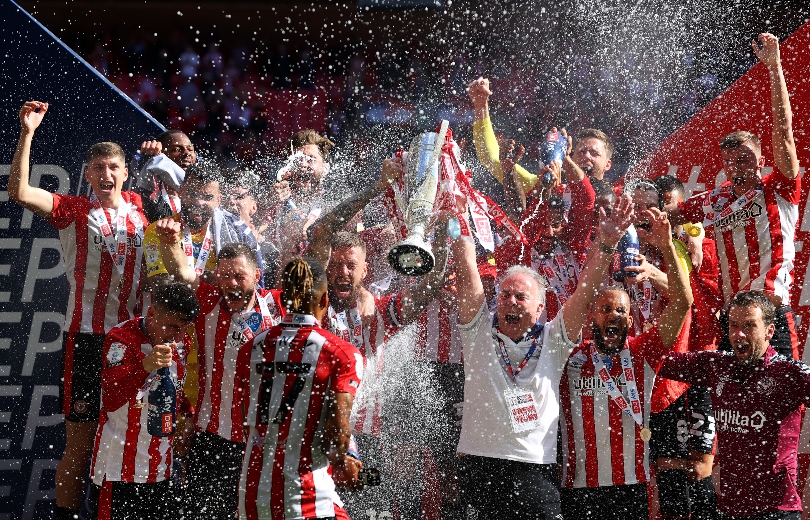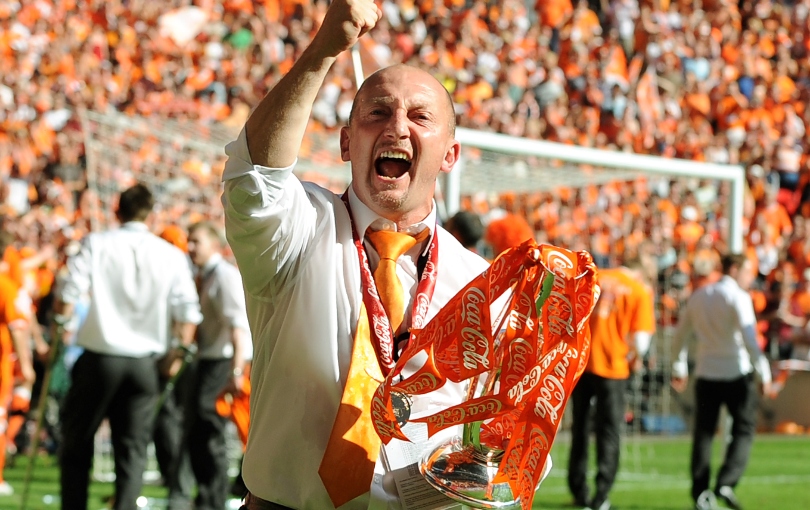The best way to end a season? Why the EFL play-offs encapsulate football’s ability to delight and despair
Twelve teams every year vie for promotion from the EFL play-offs, but only three are ever successful. FourFourTwo delves into the range of emotions present in these games as a result

The 97th minute of Sunday May 12, 2013, will live long in the memory of English football fans. A day which contained 30 seconds of pure madness that has come to epitomise why the play-offs are as heralded as they are.
With the tie levelled at 2-2, Anthony Knockaert stepped up to the penalty spot knowing if he scored, he would send Leicester City to the Championship play-off final for a shot at promotion to the Premier League. What ensued thereafter, though, was utter chaos.
Watford goalkeeper Manuel Almunia saved Knockaert’s penalty, and just 15 touches of the ball later it was Watford, not Leicester, who would be heading to Wembley, courtesy of a brilliant counter-attacking move finished off by a Troy Deeney goal.
The play-offs have come to define the conclusion of the EFL season, where 12 teams in three divisions roll the dice for the final time in an attempt to reach the league above. Introduced to English football in 1987, the play-offs have produced plenty of other fascinating moments like the Watford vs Leicester tie across the years.
Ian Holloway knows only too well about the agony and ecstasy the play-offs can bring. During a four-season spell between 2010 and 2013, Holloway made the Championship play-off final on three occasions and endured every emotion possible.
He guided underdogs Blackpool to the Premier League in 2010 by beating Cardiff City 3-2, before losing just two years later with the same side against a West Ham United side simply too strong for the division. Holloway returned to the final a year later, this time with Crystal Palace, where he won promotion once again.
When speaking to FourFourTwo, there is a real sense of enthusiasm from the man who clearly loves the game so much. For Holloway, the play-offs heighten these footballing senses in every way possible.
Get FourFourTwo Newsletter
The best features, fun and footballing quizzes, straight to your inbox every week.
“Everything’s on a knife edge - the whole 46-game season that takes such a long time to get through, a bit like a marathon, and now all of sudden you’re in a sprint to get to the line,” Holloway told FFT. “So, it heightens every emotion that you’ve got, and it puts an importance on every single thing that your team does, because it could be the last thing that you do or the pinnacle of everything that you’ve done for the past ten months.
“You get to the play-offs and there’s a roller coaster there. The circus has turned up in the park and it’s what you’ve aimed for, but it’s all or nothing.
“If you go up in the play-offs, it’s the best feeling and if you lose in the semi-finals it’s the worst feeling - and if you lose at Wembley it’s probably even worse than that.”

However, Holloway hasn’t always been a fan of the play-offs.
“When they were first introduced I thought they were a terrible idea,” he said. “I was still a player and thought ‘this is not right’. We’ve worked hard for 46 games and someone who’s sixth can take your place if you’re third by beating you in one game, but if you look over 46 games, you’re the better team.”
Holloway may be correct. They might not be fair. When looking at the average finishing position of each team promoted through the play-offs since 1990, the statistics go some way to indicating this. But perhaps this unfairness is what makes them so intriguing.
Over the last 32 seasons, where the play-offs have been in its current format, 37 of the 96 promoted teams across the three divisions have finished in the place directly below the automatic promotion positions, representing 38.6 per cent of the teams promoted. While this is the most of any other finishing position, the fact that 59 other teams have been promoted having not finished in the highest position in the league highlights the unexpected is always possible in the play-offs.
As Alasdair Bell, Chairman of the Huddersfield Town Supporters’ Association, describes it, the play-offs give sides a constant opportunity throughout their campaigns. Though it arguably isn’t fair, it certainly makes things a lot more interesting.
“The play-offs give meaning to the second half of the season,” Bell said. ”Otherwise, the second half of the season would just be everyone going through the motions until the next time they have the chance of automatics. It’s just generally exciting as well, isn’t it?
“Obviously, you don't get this sort of thing in the Premier League. I think the format is very exciting.”
Crystal Palace fan Dan - who goes by the Twitter pseudonym HLTCO, named after Rob Hawthorne’s “Hopkin looking to curl one” commentary of the 1997 play-off final between Crystal Palace and Sheffield United, where Palace captain David Hopkin scored a last-minute winner at Wembley - has seen his team promoted via the play-offs on no-less than four occasions, the most out of any other club since the inception of the EFL play-offs in 1987.
While he doesn’t have first-hand experience of witnessing his club gain promotion automatically, Dan believes that there isn’t the same level of emotional investment in going up through conventional means. In that, there is a certain level of beauty for the Palace fan.
“It's this two-week-long lottery, where form goes out of the window,” he said. “You have this very pressurised situation where everyone knows what they’re getting into before a ball’s kicked, but the stakes are so incredibly high, specifically with the Championship play-offs going into the Premier League because of the money involved.
“Also, if you look at League One and League Two, there's just something special about it. There's no doubt about it. You have this gruelling 46 game season and then all of a sudden it comes down to this last two legged semi, potentially a final, and if you do win them the feeling is unmatched.
“Obviously, it is the same as winning any other game of football, but with the stakes to be as high as they are, I don't think I would swap them for anything. I think they’re the best thing about the Football League.”

It’s this excitement for the neutrals, who don’t necessarily have a stake in the outcome of the game, where the true intrigue lies. That infamous game between Watford and Leicester in the play-off semi-finals of 2013 highlights this in immense fashion, producing the absurd and the sublime, capturing the delight and desolation which has so often come to epitomise English football.
Despite alluding to the excitement the play-offs offer, Alisdair Bell offers a contrasting perspective to getting promoted through the play-offs. He suggests automatic promotion indicates you have a better team, thus more likely to survive relegation the following season in the higher division.
With his team due to play Luton Town in this year’s Championship play-offs, Bell also offers a differing of emotions between this campaign and the experiences of 2017, when Huddersfield were last in this situation.
“You'd rather you'd rather go up automatically, you’re more likely to be a better team,” Bell told FFT. “In the 2017 season, I'd much rather have gone up automatically because that was just stressful. You don't know if it’s [getting promoted to the Premier League] ever going to come around again.
“Whereas this time around, where we have had Premier League football recently, it's not as tense for us. We're not needing it as much emotionally as we did back then.”
The emotions he discusses cannot be overlooked, though. After all, in 2017 Huddersfield were hoping to return to the top flight of English football for the first time since 1972, creating a 45 year long yearning at the club. Holloway concurs, suggesting it is worse when you are involved in them with an emotional investment.
“In the early days, I think my lads read my mood around the play-off matches - and they read it as worried,” Holloway added. “That didn’t help them. As I got older, I learned to keep those emotions in check and just make everybody focus on the process.
“Everyone knows they’re huge occasions, but somehow you have to try to bring everything back to normal.”
As Holloway concludes, the play-offs represent the culmination of a full season’s work, and the reward at the end of a final is matched by only one other match in football. That, he argues, is what makes them so important.
“For three out of four years I was in the biggest game apart from the Champions League final,” he said. “The play-off final is even bigger than the FA Cup final, in my opinion, because of the whole season’s work and the financial benefits to your club.
“I hope we never lose it. I think the play-offs are such a marvellous thing and it ends in this wonderful, pinnacle of a day which you’ll never forget.”

Ryan is a staff writer for FourFourTwo, joining the team full-time in October 2022. He first joined Future in December 2020, working across FourFourTwo, Golf Monthly, Rugby World and Advnture's websites, before eventually earning himself a position with FourFourTwo permanently. After graduating from Cardiff University with a degree in Journalism and Communications, Ryan earned a NCTJ qualification to further develop as a writer while a Trainee News Writer at Future.
